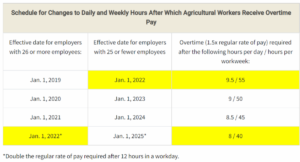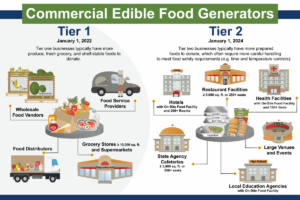Legislation to Take Effect in 2022
A new year means new legislation for businesses to prepare for. Below are a few noteworthy laws and regulations taking effect on January 1, 2022:
In accordance with the timeline established by SB 3 (Leno), signed in 2016 by California’s previous Governor Jerry Brown, the state’s minimum wage will increase by one dollar until it reaches $15.00/hr for all employees in 2023. At that point, “the rate will be adjusted annually for inflation based on the national consumer price index for urban wage earners and clerical workers (CPI-W).” This year, the new minimum wage rates are as follows:
- For employers with 25 employees or less, minimum wage will go up to $14.00/hr.
- For employers with 26 employees or more, minimum wage will go up to $15.00/hr.
Labor Code section 1182.12 defines “employer” as: “any person who directly or indirectly, or through an agent or any other person, employs or exercises control over the wages, hours, or working conditions of any person [and] includes the state, political subdivisions of the state, and municipalities.” Employees are considered to be “any individual performing any kind of compensable work for the employer who is not a bona fide independent contractor… including salaried executives, part-time workers, minors, and new hires.” The Labor Commissioner’s FAQ page regarding these increases can be found here.
Enacted in 2016, AB 1066 (Gonzalez) created a schedule phasing in overtime requirements for agricultural workers over the course of 4 years, from 2019 to 2022. “Beginning January 1, 2022, the bill [will] require any work performed by a person, employed in an agricultural occupation, in excess of 12 hours in one day to be compensated at the rate of no less than twice the employee’s regular rate of pay. The bill [will] provide employers who employ 25 or fewer employees an additional 3 years to comply with the phasing in of these overtime requirements.” The timetable published by the Department of Relations for overtime pay can be found below.

An FAQ on this overtime requirement can be found here.
AB 979 (2020) states that a publicly held domestic or foreign corporation whose principal executive offices are in California shall have at least one director from an underrepresented community on its board no later than 12/31/2021. The bill further establishes that no later than 12/31/2022, those corporations shall comply as follows:
- A corporation with four or less directors have at least one director from an underrepresented community.
- A corporation with more than four but fewer than nine directors have a minimum of two directors from underrepresented communities.
- A corporation with nine or more directors have a minimum of three directors from underrepresented communities.
“Director from an underrepresented community” is defined as “an individual who self-identifies as Black, African American, Hispanic, Latino, Asian, Pacific Islander, Native American, Native Hawaiian, or Alaska Native, or who self-identifies as gay, lesbian, bisexual, or transgender.”
“Publicly held corporation” is defined as “a corporation with outstanding shares listed on a major United States stock exchange.”
Currently, the law requires the Division of Occupational Safety and Health to issue a citation for a violation of provisions relating to the spraying of asbestos, or any standard, rule, order, or regulation established pursuant to specified provisions of the California Occupational Safety and Health Act of 1973 if, upon inspection or investigation, the division believes that an employer has committed a violation.
SB 606 broadens Cal/OSHA’s scope of enforcement by establishing a rebuttable presumption that a violation committed by an employer that has multiple worksites is enterprise-wide if:
- The employer has a written policy or procedure that violates these provisions, except as specified; or
- The division has evidence of a pattern or practice of the same violation committed by that employer involving more than one of the employer’s worksites.
The bill authorizes the division to issue an enterprise-wide citation requiring enterprise-wide abatement if the employer fails to rebut such a presumption.
SB 606 also requires Cal/OSHA to issue a citation for each “egregious violation” to an employer the Division believes to have willfully violated an occupational safety or health standard.
“A violation is an ‘egregious violation’ if one or more of the following is true about that employer or the willful violations committed by it:
- The employer, intentionally, through conscious, voluntary action or inaction, made no reasonable effort to eliminate the known violation.
- The violations resulted in worker fatalities, a worksite catastrophe, or a large number of injuries or illnesses. For purposes of this paragraph, ‘catastrophe’ means the inpatient hospitalization, regardless of duration, of three or more employees resulting from an injury, illness, or exposure caused by a workplace hazard or condition.
- The violations resulted in persistently high rates of worker injuries or illnesses.
- The employer has an extensive history of prior violations of this part.
- The employer has intentionally disregarded their health and safety responsibilities.
- The employer’s conduct, taken as a whole, amounts to clear bad faith in the performance of their duties under this part.
- The employer has committed a large number of violations so as to undermine significantly the effectiveness of any safety and health program that may be in place.”
This bill makes procedural modifications to how the Department of Fair Employment and Housing (DFEH) enforces California’s civil rights laws and updates the Fair Employment and Housing Act (FEHA) to specify the deadlines by which people must file complaints with DFEH. Additionally, SB 807 extends how long employers must retain specified employment records to match a recent increase in the length of time that workers have to file claims alleging employment discrimination. Under this law, the employer record retention requirement is extended from two to four years with specified extensions when a complaint has been filed.
The DFEH is required to investigate filed complaints alleging a violation of the FEHA and attempt to eliminate the unlawful practice by conference, conciliation, and persuasion. If conference, conciliation, mediation, or persuasion fails and the DFEH has required all parties to participate in a mandatory dispute resolution, as specified, the FEHA authorizes the director to bring a civil action in the name of the DFEH on behalf of the person claiming to be aggrieved within a specified amount of time. The DFEH is authorized to bring a civil action in any county to enforce the civil rights laws under its mandate if the civil action includes class or group allegations on behalf of DFEH.
SB 826 (2018) required that a publicly held domestic or foreign corporation whose principal executive offices are located in California must have at least one female director on its board by no later than the close of the 2019 calendar year. By the end of this calendar year, these same corporations must have:
- “If its number of directors is six or more, the corporation shall have a minimum of three female directors.
- If its number of directors is five, the corporation shall have a minimum of two female directors.
- If its number of directors is four or fewer, the corporation shall have a minimum of one female director.”
SB 1383 (2016) sets forth methane emissions reduction targets in a statewide effort to reduce emissions of short-lived climate pollutants (SLCP). The targets must:
- Reduce organic waste disposal 50% by 2020 and 75% by 2025.
- Rescue for people to eat at least 20% of currently disposed surplus food by 2025.
Certain food businesses will be required to donate the maximum amount of edible food they would otherwise dispose, to food recovery organizations. The law phases food donors in under two tiers. The first tier is required to donate starting in 2022. The second tier is required to donate starting in 2024. Information on the two tiers can be found in the infographic below provided by CalRecycle.

Though these targets will not be evaluated based on a “good faith effort” standard, CalRecycle has stated their primary concern is on compliance, and “will dedicate enforcement efforts to the most egregious offenders.” To view CalRecycle’s FAQ on SB 1383’s implementation, click here. View Update